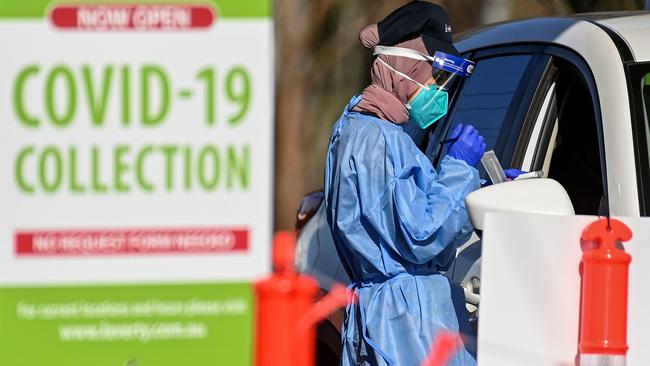‘Pay it forward’ to cut migrants’ Covid-19 vaccine hesitancy
Vaccine-hesitant migrant communities in Sydney should take a ‘pay it forward’ approach to boost jab rates by encouraging each person vaccinated to urge family members or friends to follow suit.

Vaccine-hesitant migrant communities in Sydney should take a “pay it forward” approach to boost jab rates by encouraging each person vaccinated to urge family members or friends to follow suit.
Such grassroots approaches from trusted sources work better than mass government communications often missed by people from non-English speaking backgrounds, even when produced in their own language, political consultant Kosmos Samaras says.
“Look at the case of the Hispanic nurse in the US who had the vaccine, then booked appointments for 10 of her 40 extended family,” Mr Samaras said. “She then encouraged each of them to approach five of their friends to get vaccinated, and so on, and you had the flow-on effect.
“Using trusted family members and respected individuals within diverse communities to encourage the right behaviour to deal with Covid works well. It has been used by some state governments here, but not specifically on the vaccination rollout.”
Mr Samaras, a former deputy campaign director for the Victorian Labor Party, is a director of Redbridge Group Australia, which has conducted research into social attitudes to Covid-19.
He along with community leaders and local councillors say last year’s difficult Covid-19 experience in ethnically diverse and lower socio-economic status areas in Melbourne offers clear lessons for a similarly diverse Fairfield, currently the largest hotspot in the Sydney outbreak.
Almost four in five Fairfield residents have both parents born overseas. More than one in seven people in the Fairfield local government area was born in Vietnam, and almost 10 per cent in Iraq. The local government area is home to 14 per cent of all Vietnam-born people in Australia and 28 per cent of Iraq-born.
Brimbank in Melbourne’s west was one of the worst hit areas for Covid, its 2037 cases accounting for almost 10 per cent of the total outbreak. Seventy per cent of its residents have parents born overseas, and it is home to the second-highest number of Vietnam-born people, 10 per cent of the total.
The Hume LGA in Melbourne’s north was another with a high Covid count, at 1662 cases.
It has more than 50 per cent of people with both parents born overseas, with Iraq being the top country of birth after Australia. It is home to 16 per cent of all Iraq-born in Australia.
Mr Samaras said people in these communities were more vaccine-hesitant as their experiences in the health system tended to be poor and their trust in government low. “Couple this with the fact that becoming ill in their home country might have seen them ostracised from the community rather than being looked after, it is no wonder there is a high bar to hurdle to have them engage on Covid protection,” he said.
Hume mayor Joseph Haweil said it was the economic profile as much as the racial or linguistic profile in Fairfield that could be the challenge to containing the spread of coronavirus. “We are talking about blue-collar workers, people working multiple jobs, going site to site. Working from home is often not an option. That’s what contributed to the spread of the virus in our municipality and is also a likely scenario in Sydney’s affected areas,” he said.
Mr Haweil also said household size and concepts of family made containment more difficult. “In our electorates, households aren’t two or three people, they’re often more like five or six. In an Anglo-Celtic version of a household, it is partners and children, in multicultural households it can be cousin, second cousin, aunts and uncles.
“It’s just harder for everyone to stay stuck indoors in these bigger households.”
Mr Haweil said grassroots campaigns to encourage vaccination and Covid-safety were more effective. “This is where the Victorian government sunk large amounts of money, to fund small ethno-specific organisations motivated to protect constituents.”
Ahmed Hassan, executive director of multicultural support organisation Youth Activating Youth, said Fairfield could benefit from Melbourne’s experience by focusing on explaining the benefits of Covid prevention and vaccination.
“There should be less use of police and enforcement, and more engagement and communication. That needs to be the right communication, and reducing the misinformation,” Mr Hassan said.



To join the conversation, please log in. Don't have an account? Register
Join the conversation, you are commenting as Logout